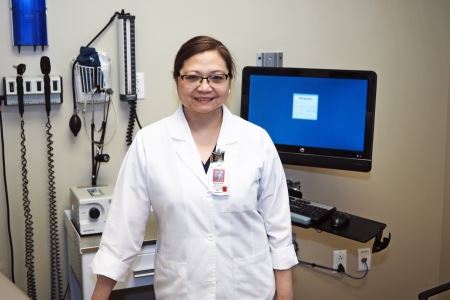
Open Accessibility Menu
Hide
dfh
Close Alert
Close Alert
Author: Monette Domingo, RN
Specialty: Nurse Navigator

A cancer diagnosis is overwhelming. From accepting the initial news to navigating treatment options and adapting to treatment plans, cancer patients have to make drastic adjustments to their lives. All of these changes, understandably, result in high levels of fear, anxiety, and stress.
Alleviating that stress and helping cancer patients feel less overwhelmed throughout their treatment and recovery is one of the most rewarding aspects of my role as a nurse navigator.
At Washington Hospital, nurse navigators are clinical nurses with specialized training in oncology and in navigating all aspects of a patient’s cancer care. All at once, we act as an advocate for personalized patient care, a liaison between the patient and the medical team who treat them, and as a coordinator for the logistical or “behind-the-scenes” aspects of each of our patient’s care. Nurse navigators are educators. In order to empower patients to participate in their treatment plan, it’s important that they understand the expected side effects.
We are passionate about optimizing our patients’ experience by ensuring that they have the resources, information, and compassionate support they need at every stage of their treatment and well into their recovery and survivorship.
Here are just a few of the ways nurse navigators help patients.
We are one of the first care professionals that our patients speak to once they receive their diagnosis, and we are a constant resource for them from that point on. Nurse navigators assist patients with scheduling treatments and help them monitor their continued progress. As their care liaisons, we coordinate their care while helping them manage communications from the Hospital and from their providers.
Our goal is to mitigate or eliminate any and all potential barriers for our patients so that they can remain focused on their recovery. Potential obstacles for treatment are assessed during the initial appointments, and regular stress assessments are conducted to ensure that our patients are having their needs met at every stage. Sometimes additional needs may surface through our conversations during treatment appointments. Patients may need referrals to other service providers throughout the Healthcare System, such as dietitians, social workers, or care providers in the lymphedema center.
While patient stress levels are understandably high when they start treatment, their stress scores almost always decrease after that initial appointment and as they continue to work with us.
Not all patients have access to a vehicle or public transportation services. Additionally, some patients simply cannot travel to and from treatments or appointments on their own. We work with those patients to arrange safe and reliable transportation for their care. At the Radiation Oncology Center at Washington Hospital, our nurse navigators partner with Drivers for Survivors in order to ensure that our patients have access to transportation, and to drivers who genuinely care for their safety and well-being.
It is no secret that medical expenses are an incredibly stressful aspect of undergoing cancer care and treatment. We work closely with patients in order to provide a sound understanding of their care and insurance options. We also work diligently to ease the burden for our patients by identifying potential financial support resources.
Physical cancer treatments are, of course, the critical aspect of a successful recovery, but the most effective cancer care plans address every aspect of patient health—mind, body, and spirit. Nurse navigators are responsible for helping patients monitor their emotional health while providing them with outlets for support when they need it. We have the ability to refer patients to counselors or other mental health specialists, and we may encourage patients to adopt mindfulness exercises like meditation, which can help alleviate fear or manage stress.
Ultimately, nurse navigators are an ongoing source of comfort, assurance, and advocacy for cancer patients. Our primary goal, other than seeing them through to recovery, is to make sure they know that they are not alone. Personally, it is an honor to be a constant presence for my patients, to help them optimize their care, and to continue supporting them in their survivorship journeys.
Visit the Washington Hospital website to learn more about the Radiation Oncology Center, your personal cancer care options, or to explore our additional patient support resources.
Posted April, 2020